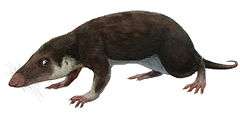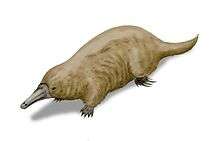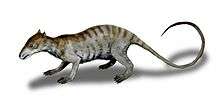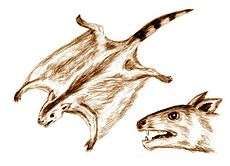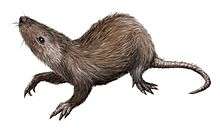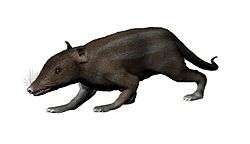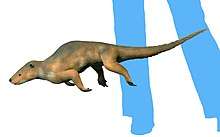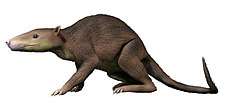Tombaatar
Tombaatar is a mammal genus that existed during the Mongolian Upper Cretaceous period. It co-existed with some of the late dinosaurs. This animal was a member of the extinct order Multituberculata, within the suborder Cimolodonta and family Djadochtatheriidae. The genus Tombaatar was named by Rougier G.W., Novacek M. and Dashzeveg D. in 1997.
| Tombaatar Temporal range: Late Cretaceous | |
|---|---|
| Fossil | |
| Scientific classification | |
| Kingdom: | |
| Phylum: | |
| Class: | |
| Order: | |
| Family: | |
| Genus: | Tombaatar |
| Species: | T. sabuli |
| Binomial name | |
| Tombaatar sabuli Rougier G.W., Novacek M. & Dashzeveg D., 1997 | |
The species Tombaatar sabuli is known from remains found in the Upper Cretaceous Djadokhta Formation of Ukhaa Tolgod, Mongolia. Tombaatar was a relatively large multituberculate. The skull is about 6 cm in length.
References
- Rougier, Novacek & Dashzeveg (1997), "A new multituberculate from the late Cretaceous locality Ukhaa Tolgod, Mongolia: Considerations on multituberculate interrelationships", American Museum Novitates 3191, p. 1-26.
- Kielan-Jaworowska, Z. & Hurum, J.H. (2001), "Phylogeny and Systematics of multituberculate mammals", Paleontology 44, p. 389-429.
- Much of this information has been derived from Mesozoic Mammals: Djadochtatherioidea, an Internet directory.
| ||||||||||||||||||||||||||||||||||||||||||||||||||||||||||||||||||||||||||||||||||||||||||||||||||||||
| ||||||||||||||||||||||||||||||||||||||||||||||||||||||||||||||||||||||||||||||||||||||||||||||||||||||
| ||||||||||||||||||||||||||||||||||||||||||||||||||||||||||||||||||||||||||||||||||||||||||||||||||||||
| ||||||||||||||||||||||||||||||||||||||||||||||||||||||||||||||||||||||||||||||||||||||||||||||||||||||
| ||||||||||||||||||||||||||||||||||||||||||||||||||||||||||||||||||||||||||||||||||||||||||||||||||||||
| ||||||||||||||||||||||||||||||||||||||||||||||||||||||||||||||||||||||||||||||||||||||||||||||||||||||
| ||||||||||||||||||||||||||||||||||||||||||||||||||||||||||||||||||||||||||||||||||||||||||||||||||||||
| ||||||||||||||||||||||||||||||||||||||||||||||||||||||||||||||||||||||||||||||||||||||||||||||||||||||
| Taxon identifiers |
|---|
This article is issued from Wikipedia. The text is licensed under Creative Commons - Attribution - Sharealike. Additional terms may apply for the media files.
